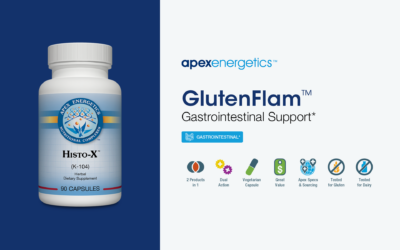Blog

Boost Immunity By Lowering Histamine?
The role of histamine in allergy is well-known. What may be less well-known or considered is that histamine can negatively impact immunity.1 During the histamine response process, inflammatory cytokines, including IL3, IL4, IL5, IL8, IL13, TNF-alpha, and prostaglandin E2, are produced and circulate through the system, causing inflammation, allergic symptoms, and in some cases, histamine intolerance.2 The deleterious effects of this process, when overactive, may be chronic unresolved inflammation and compromised immunity.1 2

Stress-Busting Habits and Adaptogens for Better Immunity
Many people are trying to cope with unexpected global changes that have turned life as we know it upside down. Amid the turbulence, increased stress-response activation can arise and set-off a cycle that, over time, may lead to adrenal exhaustion and low cortisol. In...
No Results Found
The page you requested could not be found. Try refining your search, or use the navigation above to locate the post.
Browse Your Favorite Hardware
Mobile Phones
FM Spotlight™
Stress Resilience Results Spotlight
Welcome to the Stress Resilience Results Spotlight™ in this series on extreme stress and the digestive system.
Stress-Digestion
In this issue, Dr. Datis Kharrazian highlights key areas of support to help combat the effects of stress, with particular emphasis on the digestive system.† He expands his discussion into neurotransmitter support, based on patient mood profile.
The “Perfect Storm” of Stress Research Spotlight
We are in the midst of stress’ “Perfect Storm”: Between health worries, economic uncertainty, political concerns, online schooling, and the social/emotional issues associated with the holidays and lockdowns, many people are caught up in a damaging cycle of extreme stress. The effects of continual stress-response activation are far-reaching, affecting all body systems, with one of the most impacted being the digestive system.
GlutenFlam™ Results Spotlight
In the last two FM Spotlights, we presented information about the prevalence of wheat and milk reactivities in “healthy” people and the immune-related downstream effects seen after exposure. In this Results Spotlight™, experienced clinicians will present how to translate all that we’ve discussed in this series into reliable clinical results.
With the increase in food consumption (and dietary proteins) during the pandemic, compounded by the approaching holidays, supporting protein digestion and reducing protein reactivity become even more critical.
Gluten Reactivity in the Brain Clinical Spotlight
Neurological Signs of Gluten Reactivity
In this short excerpt from his seminar, The Gluten, Leaky Gut, Autoimmune Connection™, Dr. Kharrazian shares clinical jewels regarding ways immune-triggering gluten proteins present as autoimmune reactivity in the brain.
Dietary Proteins and Immune Reactivity Research Spotlight
Immunologic Reactions to Dietary Proteins Higher Than Thought!
Did you know that up to 5x more “healthy” or GI asymptomatic people may be reacting to dietary proteins than previously thought? Dr. Kharrazian collaborated with Dr. Vojdani and Dr. Mukherjee to publish important research on immunological reactions to key dietary proteins in healthy subjects and the prevalence of these reactions in the general population.
The aim of the study was to look at the presence of IgG, IgM, and IgA antibodies against two widely consumed foods, wheat, and milk. What they found will impact the way your patients may think about dietary sensitivities and the potential for cross-reactivity.
All Categories
Startups
Events
Videos
Mobile Phones
Workspace
Accessories
Photography
Funding
Devices
Gifts
Stay Up to Date With The Latest News & Updates
Access Premium Content
Sed ut perspiciatis unde omnis iste natus error sit voluptatem accusantium doloremque
Join Our Newsletter
Sed ut perspiciatis unde omnis iste natus error sit voluptatem accusantium doloremque
Follow Us
Sed ut perspiciatis unde omnis iste natus error sit voluptatem accusantium doloremque





